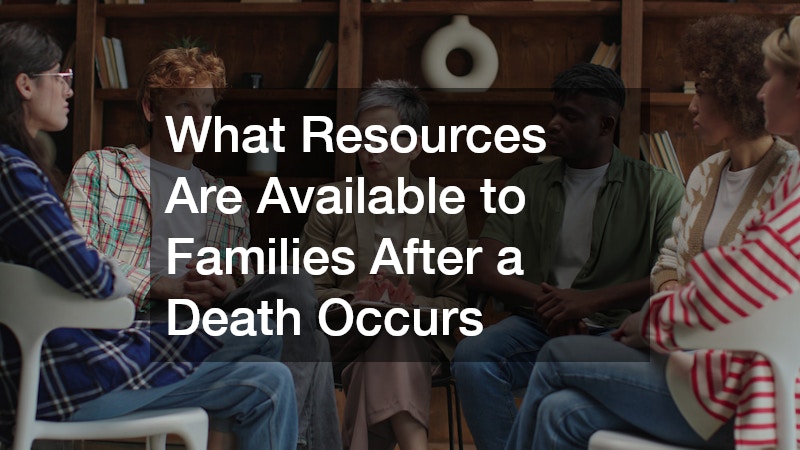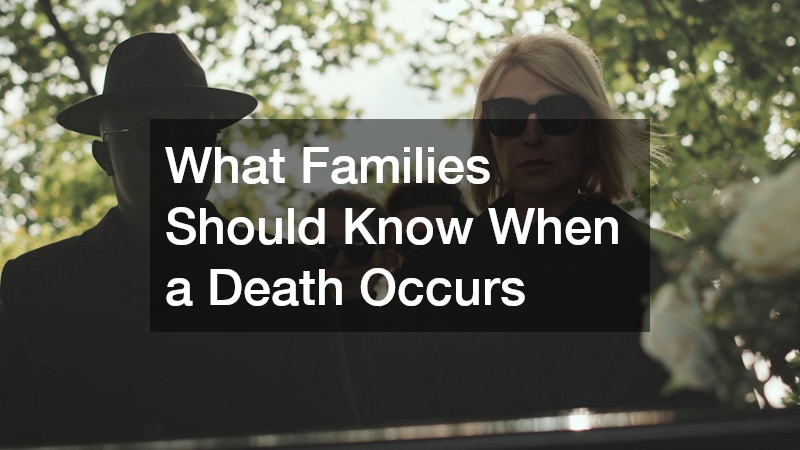The death of a loved one is an emotionally charged event that brings immense stress, practical challenges, and legal responsibilities. Families often feel overwhelmed by the immediate tasks that follow, from funeral planning to handling finances and understanding legal requirements. Being prepared and knowing the steps to take can provide a sense of control and comfort during such a difficult time.
What Are the First Steps When a Death Occurs?
Understanding Legal Pronouncement
When a death occurs, a doctor, coroner, or hospice professional provides a legal pronouncement, confirming the death and allowing families to arrange a funeral, request death certificates, and manage legal matters. A wrongful death lawyer may be involved if negligence is suspected.
Contacting Family Members and Friends
Notifying close relatives and friends is necessary and emotionally challenging. Prompt communication allows loved ones to offer support and plan attendance at the funeral or memorial. Families may use calls, emails, or social media, and may also arrange a sympathy flower service to express condolences.
Choosing a Funeral Home
Selecting a funeral home is an important decision affecting logistics and costs. Families choose between a traditional funeral, cremation, or other memorial options. Funeral homes guide transportation, paperwork, and casket or urn selection, and can help plan immediate or memorial services.
Arranging for the Transportation of the Deceased
Transporting the deceased requires careful planning, especially if death occurred away from home or across state lines. Funeral homes usually handle this, though families may work with a local towing company for vehicles or property. Timely, respectful transport honors the deceased.
Securing the Deceased’s Property
Securing the deceased’s property prevents theft or damage. Families should lock homes, vehicles, and storage units, and may use indoor storage for keepsakes or items awaiting distribution, allowing focus on emotional and legal matters.
How to Handle Legal and Financial Matters

Locating Important Documents
Families should locate vital documents like wills, trusts, insurance policies, and property deeds. These are essential for managing the estate, handling obligations, and ensuring wishes are respected, streamlining dealings with banks, insurers, and legal representatives.
Notifying Employers, Banks, and Insurance Companies
Immediate notification of the deceased’s employer, banks, and insurance providers is needed to manage benefits, life insurance, and payroll. Certified death certificates are usually required, and lenders must be contacted about any outstanding debts to prevent legal issues.
Understanding the Role of the Executor
The executor of the estate oversees the administration of the deceased’s assets and obligations. This role includes filing necessary tax returns, distributing property, and settling debts. Executors may consult with a wrongful death lawyer or estate attorney to navigate complex legal matters and ensure compliance with local regulations.
Managing Any Outstanding Debts
Outstanding debts like mortgages, credit cards, or loans should be addressed promptly. Families review records to see which debts are secured or insured, and using cash for houses can help quickly manage real estate obligations.
Consulting With an Attorney
Seeking legal counsel offers guidance on estate matters, taxes, and disputes. Probate or estate attorneys help interpret wills, file documents, and handle claims, especially in cases involving a wrongful death lawyer, business succession, or complex property distribution.
What Steps Are Necessary for Funeral Planning
Deciding on Burial Versus Cremation
A key decision in planning a funeral is choosing burial or cremation. Personal beliefs, culture, and budget influence this choice. Cremation offers flexible memorial options, while burial provides a physical site. Families often consult funeral directors to decide.
Planning the Funeral Service
Funeral services honor the deceased while providing an opportunity for friends and family to gather and grieve collectively. Planning involves choosing a venue, determining attendees, selecting readings or music, and coordinating logistics. Funeral homes often offer complete planning packages, which may include arrangements for a sympathy flower service and assistance with memorial programs.
Selecting a Casket or Urn
Choosing a casket or urn is both a practical and symbolic decision. Options range from simple and economical to elaborate and customized designs. Funeral homes typically display a range of products and can guide families in selecting one that aligns with personal preference and cultural considerations.
Writing an Obituary
Obituaries act as public notices and tributes, detailing the deceased’s life, accomplishments, and funeral arrangements. Families may submit them to newspapers or online, often including donation or memorial instructions.
Coordinating With a Funeral Director
A funeral director manages the process, coordinating clergy, transportation, preparation, and documentation. They also advise on rituals, readings, or personalized elements that honor the deceased’s life.
How to Obtain Death Certificates

Understanding the Importance of Death Certificates
Death certificates are legal documents that confirm the fact, date, and cause of death. They are required for insurance claims, estate settlements, and other official matters. Families should understand that multiple copies may be needed for financial, legal, and personal purposes.
Requesting Copies From Local Authorities
Copies of death certificates can be requested from local health departments or vital records offices. The process typically involves submitting identification, paying a fee, and allowing for processing time. Some jurisdictions offer expedited services for an additional cost.
The Information Included in a Death Certificate
Death certificates generally include the deceased’s full name, date of birth, date and location of death, cause of death, and personal information such as marital status and parents’ names. Accurate documentation ensures legal compliance and facilitates estate settlement.
Using Death Certificates for Legal Purposes
Death certificates are essential for closing accounts, claiming life insurance, and transferring property. They may also be required for initiating cash for car programs if the deceased owned a vehicle, or to settle banking and investment matters.
Handling Delays in Obtaining Certificates
Processing delays can be stressful. Families may need to follow up with local authorities, provide additional documentation, or request temporary affidavits to proceed with urgent matters such as real estate transfers or cremation services.
How Does the Grieving and Mourning Process Affect Families
Stages of Grief
Grieving is a personal and varied experience. Common stages include shock, denial, anger, bargaining, depression, and eventual acceptance. Families should recognize that these stages may not occur linearly and that emotional responses can fluctuate over time.
Supporting Family Members Emotionally
Providing emotional support for family members is critical. Open communication, patience, and understanding help individuals navigate grief. Some families engage professional counselors, support groups, or spiritual advisors to guide the healing process.
Recognizing Signs of Complicated Grief
Complicated grief occurs when individuals struggle to progress through the normal stages of mourning. Signs include prolonged despair, inability to perform daily functions, or persistent fixation on the circumstances of death. Early recognition and professional intervention can prevent long-term mental health issues.
Professional Counseling and Support Groups
Professional counseling and support groups offer structured environments for processing grief. Licensed therapists, religious counselors, or peer support networks can provide coping strategies, validation, and tools for managing emotional and practical challenges.
Rituals and Their Role in Mourning
Rituals, both religious and secular, help families express grief and honor the deceased. Ceremonies, memorials, or personal traditions can create a sense of closure while preserving memories and fostering community support.
How to Manage Social Media and Digital Legacy
Memorializing Social Media Accounts
Families often face the challenge of managing the deceased’s social media accounts. Many platforms allow memorialization, preserving posts and photos while restricting access. This provides a digital space for friends and family to share memories safely.
Handling Email and Online Subscriptions
Email accounts, subscriptions, and online services may require deactivation or transfer. Identifying account credentials and communicating with service providers ensures that personal information remains secure.
Managing Digital Assets
Digital assets, including cryptocurrency, digital photos, or online memberships, should be inventoried and managed according to the deceased’s wishes. Executors or family members may need to consult legal counsel to access or transfer digital property.
Privacy Considerations for the Deceased
Privacy is essential when handling personal accounts and sensitive information. Families should avoid sharing login details publicly and work with reputable service providers to maintain confidentiality.
Creating a Digital Legacy Plan
Proactively establishing a digital legacy plan helps prevent complications. This may include designating account managers, outlining access instructions, and specifying posthumous handling preferences.
What Are the Options for Handling the Deceased’s Home and Belongings

Securing the Home
Securing the home is a priority. Families should change locks, monitor utilities, and ensure the property is safe. Engaging a local towing company for vehicles or using indoor storage for personal items can prevent loss or damage during estate settlement.
Gifting or Selling Possessions
Families often choose to gift, sell, or auction personal belongings. Options include estate sales, private sales, or using cash for houses programs to expedite real estate transactions. Proper documentation ensures fairness and legal compliance.
Managing Real Estate Affairs
Real estate matters may require listing properties, transferring titles, or arranging for temporary care. Full-service estate planning or assistance from professionals can streamline the process, especially when immediate decisions are required.
Donating to Charities
Donating items or assets to charitable organizations provides a meaningful way to honor the deceased. Charitable contributions may also offer tax advantages and support causes that were significant to the loved one.
Storage Solutions for Keepsakes
Families may need indoor storage for cherished belongings until decisions are finalized. Climate-controlled facilities preserve sensitive items, while organized systems ensure accessibility and peace of mind.
How Do Cultural and Religious Practices Influence Death Rituals
Understanding Diverse Practices
Cultural and religious traditions significantly influence funeral arrangements. Some families observe rituals spanning several days, while others may incorporate unique ceremonies to honor the deceased. Awareness of these practices helps families respect traditions and maintain inclusivity.
Accommodating Religious Beliefs
Respecting religious beliefs affects burial decisions, service structure, and ceremonial elements. Funeral directors often guide families in selecting appropriate options for services, including offerings such as cremation or symbolic rituals.
Cross-Cultural Considerations
Interfaith families may face challenges when blending traditions. Open discussion, consultation with spiritual leaders, and flexibility ensure that all family members feel included and respected during the mourning period.
Finding Religious Leaders and Advisors
Clergy, imams, rabbis, and other religious advisors provide guidance for rituals, prayers, and ceremonies. Early engagement ensures that services reflect spiritual needs while honoring personal preferences.
Incorporating Personal Preferences
Personalized touches such as music, readings, or visual tributes allow families to celebrate the unique life of the deceased. Incorporating hobbies, achievements, or memorable experiences adds a meaningful dimension to the service.
What Resources Are Available to Families After a Death Occurs

Bereavement Counseling Services
Professional counseling helps families process grief and emotional stress. Licensed therapists and grief specialists provide coping techniques, support, and guidance during the difficult months following a death.
Financial Assistance Programs
Various financial assistance programs can alleviate the burden of funeral costs, estate settlement, or urgent expenses. Families may explore government benefits, non-profit grants, or local community resources for support.
Support Groups and Networks
Support networks connect individuals experiencing similar losses, providing empathy, shared experiences, and coping strategies. These groups may be organized through religious institutions, community centers, or online platforms.
Literature and Educational Materials
Books, pamphlets, and online resources offer guidance on grief, estate management, and funeral planning. Families can educate themselves on legal matters, cultural practices, and emotional care during the mourning process.
Funeral and Memorial Assistance
Funeral homes and charitable organizations often provide guidance, funding, or in-kind support for services. Options may include funeral planning, full service packing and moving for estate belongings, or arranging labor only moving services for transport needs.
How to Commemorate and Celebrate the Life of the Deceased
Planning Memorial Events
Memorial events provide opportunities for reflection and communal support. Families may host gatherings, vigils, or online tributes to honor the deceased’s memory. Incorporating sympathy flower service arrangements or meaningful activities strengthens the sense of connection.
Creating Lasting Tributes and Legacies
Establishing scholarships, planting trees, or creating endowments ensures a lasting legacy. Families can collaborate with local organizations or educational institutions to memorialize the deceased in meaningful ways.
Community and Charitable Acts in Memory
Volunteering, donations, or charitable work in the deceased’s name provides a sense of purpose and continuity. Community engagement allows family and friends to honor the values and passions of their loved one.
Personalized Memory Books and Albums
Memory books, photo albums, and video compilations preserve special moments. Families can include letters, photographs, and memorabilia to create a tangible record for future generations.
Annual Remembrance Traditions
Commemorating anniversaries or birthdays fosters ongoing remembrance. Rituals such as lighting candles, sharing stories, or holding family gatherings help maintain connection and celebrate life even after formal funeral proceedings have ended.
Navigating the death of a loved one requires careful attention to legal, financial, and emotional matters. Families can benefit from understanding the steps involved, from immediate responsibilities to long-term planning. Utilizing resources such as a wrongful death lawyer, local towing company, cash for car services, and full service packing and moving assistance can alleviate practical burdens. Embracing cultural, religious, and personal traditions while honoring the deceased ensures meaningful closure and lasting memories. By thoughtfully addressing each aspect of the process, families can manage responsibilities with dignity, preserve legacies, and find comfort in shared remembrance.




